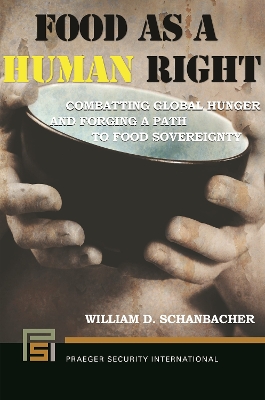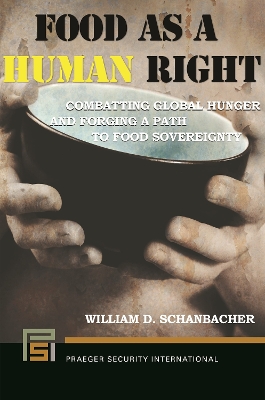Praeger Security International
4 total works
This important work addresses the difficult ethical issues surrounding the accessibility of food to all people as a human right, and not a privilege that emerges because of social structure or benefit of geography.
Food sovereignty—the right of peoples to define their own chosen food and agriculture, free of monopolization or threats—is the path to stopping global hunger. This book approaches the topic from a solutions-based perspective, discussing concrete policy providing for sovereignty, or control, of one's own food sources as a solution that, while controversial, offers more promise than do the actions of international organizations and trade agreements. Providing access to safe, healthy food is an ethical responsibility of the world's nations, not just a right of the elite or wealthy.
This book presses the need to formulate policies that address the problems of poverty and hunger on a more humane and meaningful level. Organized thematically, chapters are based on such topics as food security, food sovereignty, human rights, and sustainability that focus on the global food system. Specific case studies provide examples of global hunger and poverty issues. Taken in its entirety, the book informs readers of how their food consumption might negatively affect the global poor, while its concluding chapters offer solutions for alleviating problems in the global food system.
- Provides a better understanding of the global food system and the organizations and institutions that influence this system
- Offers suggestions on how people can engage their communities and learn more about the foods they eat
- Informs readers about the conditions under which foods are produced
- Provides resources on how to help local communities
A description of the current global food system, this book challenges our ethical responsibility to the global poor and implicates us all for failing to curb global hunger and malnutrition.
The Politics of Food: The Global Conflict between Food Security and Food Sovereignty argues that our current global food system constitutes a massive violation of human rights.
In this impassioned, well-researched book, William Schanbacher makes the case that the food security model for combating global hunger-driven by the United Nations, the World Bank, the International Monetary Fund, and other organizations-is a failure, too dependent on trade and too reliant on international agribusiness. Instead, the emerging model of food sovereignty-helping local farmers and businesses produce better quality food-is the more effective and responsible approach. Through numerous case studies, the book examines critical issues of global trade and corporate monopolization of the food industry, while examining the emerging social justice movements that seek to make food sovereignty the model for battling hunger.
Food as a Human Right: Combatting Global Hunger and Forging a Path to Food Sovereignty
by William D. Schanbacher


